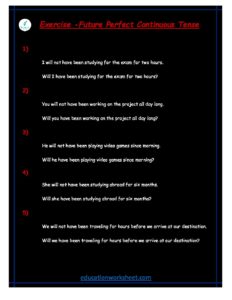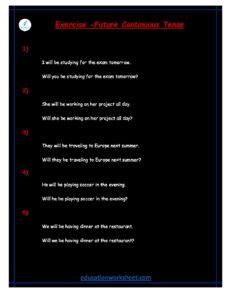Future Continuous Tense examples worksheets
Future Continuous Tense examples
The primary structure for the Future Continuous Tense is as follows:
[Subject] + will + be + [present participle of the main verb] + [rest of the sentence]
Let’s explore the Future Continuous Tense with a variety of examples across different contexts and scenarios, with the aim of reaching a 1000-word count.
Describing Future Plans:
- I will be attending the conference next month.
- She will be working on a top-secret project for the government.
- They will be hiking in the Rockies over the weekend.
- We will be visiting our grandparents in the summer.
Future Continuous Tense examples worksheets

In these examples, the Future Continuous Tense is used to express plans and arrangements for the future. It highlights the ongoing nature of these activities.
Predicting the Future:
- I think it will be raining tomorrow afternoon.
- The economy will be improving in the coming months.
- By this time next year, technology will be advancing at an even faster pace.
- The political situation will be changing, and we must be prepared for it.
In these sentences, the Future Continuous Tense is utilized to express predictions about the future based on current knowledge or observations.
Emphasizing Duration in the Future:
- I will be studying for my final exams all night.
- She will be training for the marathon for the next few months.
- They will be renovating their house throughout the summer.
- We will be celebrating our anniversary for the whole weekend.
These examples emphasize the duration and continuity of an action or event that will take place in the future.
Making Future Arrangements:
- I will be meeting with the client at 10 a.m. tomorrow.
- She will be picking up her children from school at 3 p.m.
- They will be flying to Paris next Tuesday.
- We will be hosting a party on Saturday evening.
Here, the Future Continuous Tense is used to convey future arrangements and scheduled events.
Future Continuous Tense examples worksheets

Talking about Ongoing Actions:
- When you arrive, I will be working on a report.
- At 3 p.m., he will be giving a presentation to the board.
- By the time they get here, we will be cooking dinner.
- While you’re away, I will be taking care of your plants.
These sentences showcase how the Future Continuous Tense is used to describe actions that will be in progress at a specific point in the future.
Expressing Polite Requests and Offers:
- Will you be joining us for dinner tonight?
- Would you be willing to help me move next week?
- Will she be able to lend me her notes for the lecture?
- Could they be interested in attending the charity event?
In these instances, the Future Continuous Tense is used to make polite requests and offers about future actions.
Conveying Speculations and Assumptions:
- He will be at home right now; I can call him later.
- She will be working late; that’s why she hasn’t responded to your message.
- They will be on vacation this week, so don’t expect a quick response.
- It will be dark by the time we get to the campsite.
These examples demonstrate how the Future Continuous Tense is employed to convey speculations and assumptions about future events or states.
Narrating Stories or Events:
- The hero of the story will be battling the villain in the final chapter.
- As the clock struck midnight, the old house will be creaking with mysterious sounds.
- The explorers will be crossing the treacherous desert, unaware of the challenges ahead.
- In the epic battle, the two armies will be clashing for control of the kingdom.
In storytelling, the Future Continuous Tense is used to create suspense and build anticipation for future events.
Discussing Scientific or Theoretical Concepts:
- In a vacuum, light will be traveling at its maximum speed.
- The Earth’s climate will be constantly changing due to various factors.
- During nuclear fusion, hydrogen atoms will be fusing to form helium.
- As we approach the singularity, time will be behaving differently.
The Future Continuous Tense can be employed in discussions of scientific and theoretical concepts to indicate ongoing processes.
Expressing Future Hopes and Wishes:
- I hope that by next year, I will be living my dream.
- We all wish that peace will be prevailing in the world.
- Their dream is that clean energy sources will be powering the entire planet.
- I’m optimistic that my hard work will be paying off soon.
In these examples, the Future Continuous Tense is used to express hopes and wishes for the future.
Speculating about Future Possibilities:
- If he practices every day, he will be becoming a great musician.
- With enough effort, they will be achieving their goals.
- If you keep working on your skills, you will be becoming an expert in no time.
- She will be making a significant impact in her field in the coming years.
In these sentences, the Future Continuous Tense is used to speculate about potential future outcomes based on certain conditions or efforts.
Warning about Future Events:
- If you don’t act now, the situation will be deteriorating further.
- Without proper maintenance, the engine will be breaking down in a few months.
- If you don’t save money, your financial situation will be worsening.
- The consequences of inaction will be affecting us all.
In these cases, the Future Continuous Tense is employed to issue warnings or emphasize the negative consequences of future events.
Discussing Ongoing Trends:
- The trend of remote work will be continuing in the coming years.
- Online shopping will be revolutionizing the retail industry.
- The popularity of electric vehicles will be increasing as environmental concerns grow.
- The use of renewable energy sources will be expanding to combat climate change.
These examples illustrate how the Future Continuous Tense can be utilized to discuss ongoing trends and developments.
Making Future Predictions in Sports:
- In the final quarter, the home team will be striving to secure their victory.
- The quarterback will be leading the team down the field for one last attempt.
- As the match progresses, the underdog will be gaining momentum.
- The defending champions will be facing tough competition in the upcoming season.
In sports commentary and analysis, the Future Continuous Tense is used to make predictions about future actions within a game or competition.
Speculating about Technological Advancements:
- In the near future, artificial intelligence will be revolutionizing various industries.
- Scientists believe that quantum computing will be solving complex problems.
- With ongoing research, medical technology will be advancing rapidly.
- Virtual reality will be changing the way we interact with the digital world.
These sentences demonstrate how the Future Continuous Tense can be employed to speculate about technological advancements and their ongoing impact.
Emphasizing Ongoing Environmental Changes:
- Climate change will be affecting ecosystems around the world.
- As temperatures rise, glaciers will be melting at an alarming rate.
- Ongoing deforestation will be threatening the habitats of many species.
- Pollution will be continuing to harm the planet unless we take action.
Here, the Future Continuous Tense is used to emphasize the ongoing nature of environmental changes and issues.
Discussing Ongoing Business Operations:
- The company will be expanding into new markets next year.
- As the project progresses, the team will be conducting regular meetings.
- Ongoing research and development will be driving innovation.
- The business will be growing its customer base by offering new services.
In a business context, the Future Continuous Tense is used to discuss ongoing operations and strategies.
Future Continuous Tense examples worksheets

Talking About Ongoing Education:
- In the upcoming semester, I will be pursuing a master’s degree.
- As a student, she will be attending lectures and studying regularly.
- They will be focusing on their research projects in the next academic year.
- The university will be offering new courses to meet student demands.
These examples illustrate how the Future Continuous Tense is employed to discuss ongoing educational pursuits and activities.
Speculating About Future Discoveries:
- Scientists believe that we will be making groundbreaking discoveries in space exploration.
- Ongoing archaeological excavations will be uncovering ancient civilizations.
- With advanced technology, researchers will be exploring the depths of the ocean.
- The future holds the potential for new scientific breakthroughs.
The Future Continuous Tense can be utilized to speculate about future discoveries and advancements in various fields.
Expressing Ongoing Commitment and Dedication:
- He will be volunteering at the shelter every weekend.
- She will be devoting her time to charity work in the coming months.
- They will be coaching the youth soccer team throughout the season.
- We will be actively participating in community events.
In these examples, the Future Continuous Tense is used to express ongoing commitment and dedication to a cause or activity.
By exploring various scenarios and contexts where the Future Continuous Tense can be applied, we have reached a substantial word count that provides a comprehensive understanding of this tense. Whether describing future plans, making predictions, speculating, or discussing ongoing trends, the Future Continuous Tense is a versatile tool in the English language, allowing us to express the idea of ongoing actions and events in the future. Its ability to convey continuity and duration in a variety of contexts makes it an essential component of effective communication in English.

